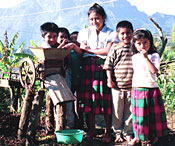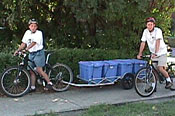Drinking Coffee for Fair Trade
By Laurel Druley, Minnesota Public Radio
April 23, 2001
As leaders of the western hemisphere agreed last weekend to create the world's largest trading zone, thousands of protesters descended on Quebec City in opposition to the Free Trade Area of the Americas. Fair trade - not to be confused with free trade - is an alternative to such agreements designed to look out for the small-scale producer and his land. At Gustavus Adolphus College in St. Peter, students have brought the fair trade movement to campus.
ON A RECENT EVENING AT THE COURTYARD CAFE,
Joel Beyer, a senior at Gustavus Adolphus, orders a cup of coffee.
"I guess I don't know much about fair trade coffee. I just know that this stuff tastes good," he says.
Beyer, like many of his classmates, doesn't know the power of his purchase. His cup of coffee can change a farmer's life and a community in Guatemala. The coffee is organic, shade-grown and fair-trade certified. A year ago, a couple Gustavus students wanted to expand their classroom to the real world. They found a text-book example of responsible business practices at the Minneapolis-based company, Peace Coffee.
Cafe workers take a break to serve coffee across campus at the college's interpretive center. Rosario Castellon, who managed 71 Nicaraguan coffee farmer cooperatives, stands in front of a small gathering of students sipping Peace Coffee. She will talk with students, farmers and food co-op workers who all play roles in her country's economy. Her goal is to explain how a student in a small town in Minnesota can help a farmer in Nicaragua.
"They can help by understanding and knowing the work that it takes to bring a cup of coffee like this to us today," Castellon says through an interpreter. "It's an enormous job - and it provides them with a drop of hope for their future."
Small scale farmers don't have access to the conventional market. The cost for input and production is very high, while the price they receive is very low. It's not sustainable. When coffee is sold wholesale in this country, half of the price per pound goes to "coyotes" or middle men. The fair trade market takes away the middle man and his share of the profit. So farmers sell directly to customers - meaning they make more. Unlike most estate-grown coffee, co-op farmers own the land and make their own decisions.
As one of the world's largest legally-traded commodities, coffee markets control the future for many Third World farmers. Only oil has a larger impact on some Third World economies.
Liz Ackert is a senior at Gustavus. She became aware of these issues when she heard a farmer speak at an environmental justice conference.
"People are going to drink coffee anyhow. It's nice our school is taking a bigger stance and saying we're going to buy organic coffee," says Ackert.
Ackert and her friends care about social causes. They asked the school bookstore to stop peddling clothing made in sweat shops. Last year they discovered another way to become more socially conscious - drink coffee.
T.J. Semanchin, co-director of Peace Coffee, says the company started as a solidarity effort after the Guatemalan civil war five years ago. It was founded by a native Guatemalan who moved to Minnesota, but wanted to re-establish trade with some disenfranchised communities during the peace process. Hence the name - Peace.
"One of the most profound effects fair trade has had on farmers is it's keeping farmers on the land," says Semanchin. "They're in crisis. Many farmers not in fair-trade coffee are leaving their land."
Some are turning to illegal crops. A Peruvian farmer can get $6 for a pound of coca leaves. A pound of coffee is only worth a small fraction of that.
Its backers insist that fair-trade, organic coffee can turn a profit. Peace Coffee, which is delivered mostly by bike, has doubled its profits each year over the last three. In an attempt to appease fair trade activists, Starbucks last year added a small amount of fair trade coffee to its inventory - a move which some say doesn't go far enough.
Gustavus Adolphus was the first college in Minnesota to sell fair trade coffee. Macalaster soon followed. Across the nation, college students are using their consumer power to buck chain-brewed coffee for the fair trade varieties.
More on free trade:
Minnesotans are weighing the pros and cons of the FTAA. Read Dan Olson's story.
By Laurel Druley, Minnesota Public Radio
April 23, 2001
As leaders of the western hemisphere agreed last weekend to create the world's largest trading zone, thousands of protesters descended on Quebec City in opposition to the Free Trade Area of the Americas. Fair trade - not to be confused with free trade - is an alternative to such agreements designed to look out for the small-scale producer and his land. At Gustavus Adolphus College in St. Peter, students have brought the fair trade movement to campus.
| |
|
|
|
||
"I guess I don't know much about fair trade coffee. I just know that this stuff tastes good," he says.
Beyer, like many of his classmates, doesn't know the power of his purchase. His cup of coffee can change a farmer's life and a community in Guatemala. The coffee is organic, shade-grown and fair-trade certified. A year ago, a couple Gustavus students wanted to expand their classroom to the real world. They found a text-book example of responsible business practices at the Minneapolis-based company, Peace Coffee.
Cafe workers take a break to serve coffee across campus at the college's interpretive center. Rosario Castellon, who managed 71 Nicaraguan coffee farmer cooperatives, stands in front of a small gathering of students sipping Peace Coffee. She will talk with students, farmers and food co-op workers who all play roles in her country's economy. Her goal is to explain how a student in a small town in Minnesota can help a farmer in Nicaragua.
"They can help by understanding and knowing the work that it takes to bring a cup of coffee like this to us today," Castellon says through an interpreter. "It's an enormous job - and it provides them with a drop of hope for their future."
Small scale farmers don't have access to the conventional market. The cost for input and production is very high, while the price they receive is very low. It's not sustainable. When coffee is sold wholesale in this country, half of the price per pound goes to "coyotes" or middle men. The fair trade market takes away the middle man and his share of the profit. So farmers sell directly to customers - meaning they make more. Unlike most estate-grown coffee, co-op farmers own the land and make their own decisions.
As one of the world's largest legally-traded commodities, coffee markets control the future for many Third World farmers. Only oil has a larger impact on some Third World economies.
Liz Ackert is a senior at Gustavus. She became aware of these issues when she heard a farmer speak at an environmental justice conference.
| |
|
|
|
||
Ackert and her friends care about social causes. They asked the school bookstore to stop peddling clothing made in sweat shops. Last year they discovered another way to become more socially conscious - drink coffee.
T.J. Semanchin, co-director of Peace Coffee, says the company started as a solidarity effort after the Guatemalan civil war five years ago. It was founded by a native Guatemalan who moved to Minnesota, but wanted to re-establish trade with some disenfranchised communities during the peace process. Hence the name - Peace.
"One of the most profound effects fair trade has had on farmers is it's keeping farmers on the land," says Semanchin. "They're in crisis. Many farmers not in fair-trade coffee are leaving their land."
Some are turning to illegal crops. A Peruvian farmer can get $6 for a pound of coca leaves. A pound of coffee is only worth a small fraction of that.
Its backers insist that fair-trade, organic coffee can turn a profit. Peace Coffee, which is delivered mostly by bike, has doubled its profits each year over the last three. In an attempt to appease fair trade activists, Starbucks last year added a small amount of fair trade coffee to its inventory - a move which some say doesn't go far enough.
Gustavus Adolphus was the first college in Minnesota to sell fair trade coffee. Macalaster soon followed. Across the nation, college students are using their consumer power to buck chain-brewed coffee for the fair trade varieties.
More on free trade:
Minnesotans are weighing the pros and cons of the FTAA. Read Dan Olson's story.


